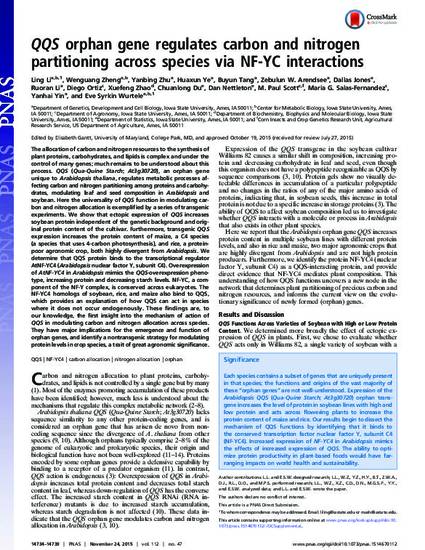
The allocation of carbon and nitrogen resources to the synthesis of plant proteins, carbohydrates, and lipids is complex and under the control of many genes; much remains to be understood about this process. QQS (Qua-Quine Starch; At3g30720), an orphan gene unique to Arabidopsis thaliana, regulates metabolic processes affecting carbon and nitrogen partitioning among proteins and carbohydrates, modulating leaf and seed composition in Arabidopsis and soybean. Here the universality of QQS function in modulating carbon and nitrogen allocation is exemplified by a series of transgenic experiments. We show that ectopic expression of QQS increases soybean protein independent of the genetic background and original protein content of the cultivar. Furthermore, transgenic QQS expression increases the protein content of maize, a C4 species (a species that uses 4-carbon photosynthesis), and rice, a protein-poor agronomic crop, both highly divergent from Arabidopsis. We determine that QQS protein binds to the transcriptional regulator AtNF-YC4 (Arabidopsis nuclear factor Y, subunit C4). Overexpression of AtNF-YC4 in Arabidopsis mimics the QQS-overexpression phenotype, increasing protein and decreasing starch levels. NF-YC, a component of the NF-Y complex, is conserved across eukaryotes. The NF-YC4 homologs of soybean, rice, and maize also bind to QQS, which provides an explanation of how QQS can act in species where it does not occur endogenously. These findings are, to our knowledge, the first insight into the mechanism of action of QQS in modulating carbon and nitrogen allocation across species. They have major implications for the emergence and function of orphan genes, and identify a nontransgenic strategy for modulating protein levels in crop species, a trait of great agronomic significance.
Available at: http://works.bepress.com/eve-wurtele/28/

This article is from Proceedings of the National Academy of Sciences of the United States of America (2015): 14734, doi: 10.1073/pnas.1514670112.